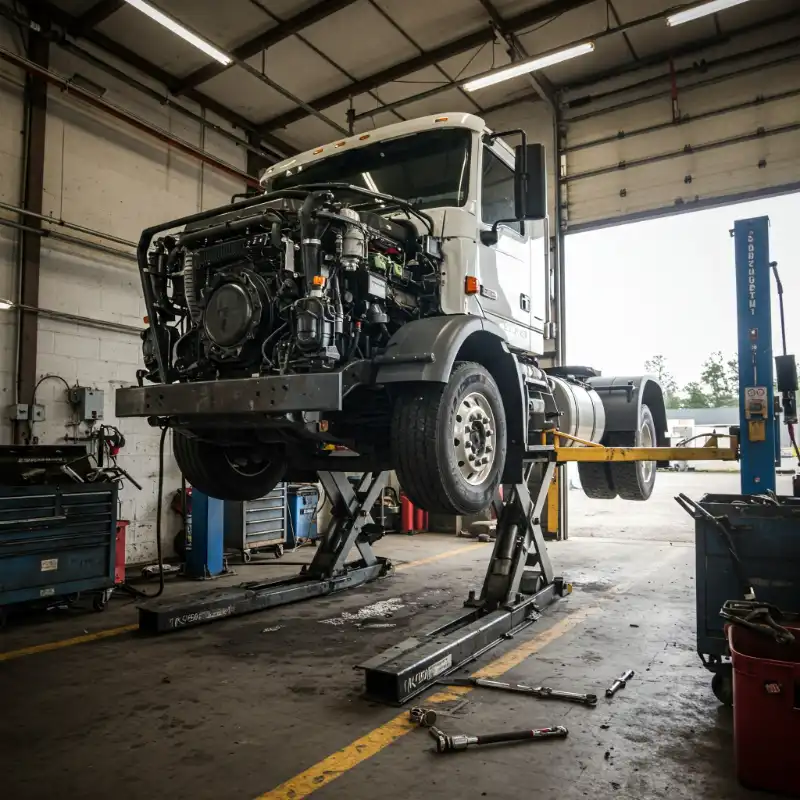When it comes to heavy-duty trucking, the tires are one of the most critical components that can significantly impact performance, safety, and operating costs. Heavy-duty truck tires are designed to endure immense stress and carry substantial loads, making them an essential investment for truck owners and fleet managers. Proper maintenance and care are paramount to ensure optimal performance and maximize the lifespan of these tires. In this blog, we'll discuss the top seven tips for extending the lifespan of heavy-duty truck tires, providing valuable insights for truck owners, fleet managers, and those in the commercial trucking industry.
Top 7 Tips for Truck Tire Longevity
1. Regularly Check Tire Pressure
Maintaining proper tire pressure is fundamental for the longevity of heavy-duty truck tires. Underinflated tires can lead to excessive wear, decreased fuel efficiency, and compromised handling. Conversely, overinflated tires can result in a harsher ride, reduced traction, and uneven tread wear. It's essential to consult the manufacturer's recommended tire pressure and conduct regular pressure checks to ensure your truck's tires are properly inflated. Maintaining optimal tire pressure can extend tire life and promote safer driving conditions.
2. Rotate Tires Periodically
Uneven tire wear is a common issue in trucks due to the varying load distribution. Regularly rotating the tires helps distribute the wear more evenly, extending their overall lifespan. Front tires tend to wear differently from rear tires, and left-side tires may experience different wear patterns than right-side tires. By following a consistent tire rotation schedule, you can balance out the wear and tear, promoting uniform tread depth and enhancing tire longevity.
3. Balance and Align Your Tires
Proper tire balance and alignment are crucial in extending the lifespan of heavy-duty truck tires. Imbalanced or misaligned tires can lead to uneven wear, reduced fuel efficiency, and steering instability. Regularly checking and adjusting the balance and alignment of your truck's tires will improve tire lifespan and enhance overall vehicle performance, ensuring a smoother and safer ride.
4. Select Appropriate Tires
Choosing the right type of heavy-duty truck tires for your specific application is essential for both performance and longevity. Different tire designs are optimized for various road conditions, load capacities, and weather scenarios. Referencing expert resources like Load King Manufacturing's guide on understanding tires for work trucks can assist you in making informed decisions about the most suitable tires for your trucking needs. Using the correct tires will minimize wear and tear, maximize fuel efficiency, and enhance tire longevity.
To learn more about choosing the right tires, click here!
5. Maintain Proper Load Distribution
Proper load distribution across your heavy-duty truck's axles is vital for preventing excessive tire wear. Uneven weight distribution can cause certain tires to bear a higher load, leading to premature wear. Implementing effective load management practices, such as evenly distributing the cargo and avoiding overloading, can significantly contribute to extending the lifespan of your truck tires.
6. Regularly Inspect for Damage
Frequent tire inspections are essential to identify any signs of damage or wear. Inspect the tires for cuts, punctures, bulges, or cracks that could compromise their structural integrity. Catching and addressing these issues early can prevent more significant problems and help extend the lifespan of your heavy-duty truck tires.
7. Follow Proper Storage Practices
When trucks are not in use, properly storing the vehicle and its tires is crucial for maintaining their longevity. Store trucks in a clean, dry, and well-ventilated environment to prevent tire degradation caused by exposure to harsh weather conditions and UV radiation. Additionally, consider elevating the tires or using tire cradles to avoid flat spots during prolonged periods of inactivity.
Why Proper Tire Maintenance is Important
Effective tire maintenance is not just a matter of saving money on replacements; it directly impacts safety, efficiency, and overall performance. Well-maintained heavy-duty truck tires provide better traction, stability, and handling, reducing the risk of accidents and breakdowns. Furthermore, by adhering to proper maintenance practices, truck owners and fleet managers can minimize downtime, increase fuel efficiency, and enhance the operational efficiency of their vehicles.
Click here to learn more about our wheel repairs and services.
Conclusion
In the world of heavy-duty trucking, the importance of maintaining the health and longevity of your tires cannot be overstated. By following these top seven tips for extending the lifespan of heavy-duty truck tires, you'll save on replacement costs and ensure safer, more efficient, and reliable trucking operations. Regularly check tire pressure, rotate tires, balance and align them, select appropriate tires for your application, maintain proper load distribution, inspect for damage, and follow appropriate storage practices to maximize the value and performance of your heavy-duty truck tires. Remember, proper tire maintenance is an investment that pays off in terms of safety, efficiency, and long-term success in the commercial trucking industry.










.webp)





























